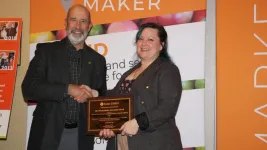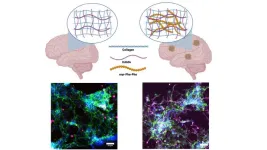(Press-News.org) The COVID-19 pandemic infiltrated almost every aspect of society and life in 2020, even in ways people wouldn’t have immediately expected. Stores that typically have no problem stocking shelves were struggling to keep pace with the sudden demand for cleaning supplies along with everything from toilet paper to Sriracha chili sauce.
While these issues aren’t as devastating as the larger health ramifications, they did shed new light on supply chain weaknesses and how that system adapts to rapid and vast market shifts. Factory closures and reduced production, increased demand for specific types of goods, labor shortages and transportation hurdles were just some of the many obstacles manufacturers faced in trying to get goods into the the hands of consumers during one of the most-challenging times in global history.
These supply chain problems underscored the importance of building more resilient, flexible and diversified strategies to better withstand unforeseen disruptions.
HarvestHub, a mobile application developed by a team at the National Center for Supercomputing Applications within the Center for Digital Agriculture, will heal COVID-damaged supply chains, help farmers increase production and get food to families in need. The app was recognized at the Farm Credit MarketMaker Innovation Awards ceremony during the 2023 National Agricultural Marketing Summit in Arlington, VA, which awarded outstanding efforts by state and local MarketMaker collaborations around the country that contribute to the development of local and regional food systems and help farmers connect to new market opportunities.
In collaboration with Google and MarketMaker, NCSA helped develop HarvestHub to make it easier for farmers to donate or sell surplus products to local food assistance programs. The app will serve as a tool to support a Farm Bureau-led “Farm to Food Bank” pilot in Illinois and ultimately for all MarketMaker affiliated partners.
“Our team designed HarvestHub to work as a tool to assist with the complex food security landscape,” said NCSA Genomics Lead Christina Fliege. “By connecting consumers and producers directly to each other, we allow them to make these negotiations directly to streamline this process.”
With HarvestHub, food producers can move their seconds and surplus at a price they set. Food assistance programs – ranging from major food banks to soup kitchens, pantries and more – can coordinate directly with them.
The NCSA team interviewed farmers and food bank representatives to discuss the initial parameters of the app to make sure the functionality was useful to all interested parties.
We use a bottom-up approach where we work closely with users – in this case, community members – to understand their day-to-day lives, the pain points they encounter and their needs not addressed by the current system. We continue working with community members throughout the entire design and development process, gathering feedback and integrating it into the digital product.
Jessica Saw, NCSA Research Scientist
While the recognition is certainly a worthwhile acknowledgement of the team’s effort, Fliege is mostly focused on the potential impact HarvestHub could have on local communities and beyond.”
“It was super exciting receiving the innovation award and getting to learn about the other finalists and their projects,” Fliege said. “There’s a lot of really cool work being done in this space right now. We’re all extremely grateful that our work was recognized, and very excited to see its potential impact come to fruition – pun intended.”
about HarvestHub and all of the projects recognized in the Farm Credit MarketMaker Innovation awards here.
ABOUT CENTER FOR DIGITAL AGRICULTURE
The Center for Digital Agriculture (CDA) draws on Illinois’ historic land-grant pillars of agriculture and engineering to shape the future of the agriculture industry. The center brings together researchers, educators, industry and agricultural producers to transform how we feed and support a growing global population through innovative approaches. CDA also boasts a Master’s of Engineering in Digital Agriculture and six certificate programs that address the profound workforce shortage in this field by providing graduates and working professionals with in-depth knowledge and technical skills. CDA is a multidisciplinary effort at the University of Illinois Urbana-Champaign between the Grainger College of Engineering, the College of Agricultural, Consumer and Environmental Sciences, the National Center for Supercomputing Applications and the Institute for Genomic Biology. CDA also leads the Artificial Intelligence for Future Agricultural Resilience, Management, and Sustainability (AIFARMS) Institute which is supported by the USDA National Institute of Food and Agriculture and the National Science Foundation.
END
HarvestHub app tackles supply chain, food insecurity issues
Developed by the NCSA Genomics team and Visual Analytics Group, HarvestHub will get more food to families in need
2024-07-12
ELSE PRESS RELEASES FROM THIS DATE:
Mathematics outreach program awarded Dolciani grant
2024-07-12
Two years after launching a new mathematics outreach program, a team of Texas A&M University professors has been awarded a Dolciani Mathematics Enrichment Grant to support their program's efforts to promote math enrichment for high school students.
The Program for Research in Mathematics (PReMa) was established in 2022 by four members of Texas A&M’s Department of Mathematics: Dr. Sherry Gong, Dr. Wencai Liu, Dr. Kun Wang and Dr. Zhizhang Xie. The program, directed by Wang, targets high school students living in Texas and neighboring states. Designed to cultivate a deep appreciation and understanding of advanced ...
Groundbreaking study reveals insights into Alzheimer's disease mechanisms through novel hydrogel matrix
2024-07-12
Los Angeles, California - May 20, 2024 - Researchers at the Terasaki Institute for Biomedical Innovation (TIBI) have unveiled a pioneering study shedding light on the intricate mechanisms underlying Alzheimer's disease (AD). The study, titled "Effects of amyloid-β-mimicking peptide hydrogel matrix on neuronal progenitor cell phenotype," represents a significant leap forward in understanding the interplay between amyloid-like structures and neuronal cells.
Led by Natashya Falcone and co-first authors Tess Grett Mathes and Mahsa Monirizad, the research team delved into the realm of self-assembling ...
Study examines urban forests across the United States
2024-07-12
In recent years, tree-planting campaigns have been underway in the United States, especially in cities, as part of climate mitigation efforts.
Urban forests can help improve air quality, generate cooling effects, and provide green spaces for outdoor recreation while also serving as an ecological habitat.
Just last year, the U.S. Forest Service announced a $1 billion campaign to expand access to trees and green spaces throughout the country, including in cities.
But a new Dartmouth-led study finds that some areas within urban forests in the U.S., may be more capable than trees growing around city home lawns in adapting to a warmer climate.
The findings are published ...
2023 Rolling Hills Estates landslide likely began the winter before
2024-07-12
Key takeaways
Landslides triggered by intense rainfall can sometimes be predicted along with incoming storms, but dry-season landslides often take people by surprise.
The July 2023 Rolling Hills Estates landslide that destroyed 12 homes seemed to come out of nowhere, but new research shows it began as early as December 2022.
Researchers are developing a database that will enable scientists to plug in new data to monitor potential landslides in real time and possibly predict them.
Californians are familiar with landslides that occur around storms, when saturated soil and ...
Rutgers researchers spot potential hazard with private well water treatment
2024-07-12
Systems designed to treat arsenic in private well water may be malfunctioning and endangering the health of people who count on them to keep their water safe, according to Rutgers researchers.
Megan Rockafellow-Baldoni, an assistant professor of environmental and occupational health and justice at the Rutgers School of Public Health, together with co-authors including Rutgers alum Steven Spayd, a retired research scientist formerly with the New Jersey Department of Environmental Protection, tested the water of 62 New Jersey homes with whole-house arsenic-removing water treatment systems. Their study was ...
When to trust an AI model
2024-07-12
CAMBRIDGE, MA – Because machine-learning models can give false predictions, researchers often equip them with the ability to tell a user how confident they are about a certain decision. This is especially important in high-stake settings, such as when models are used to help identify disease in medical images or filter job applications.
But a model’s uncertainty quantifications are only useful if they are accurate. If a model says it is 49% confident that a medical image shows a pleural effusion, then 49% of the time, the model should be right.
MIT ...
Research shows gamified investment sites have risks for novice investors
2024-07-12
TORONTO - What happens when online investment trading platforms start to resemble games that keep people playing for hours, with badges and exploding confetti to reward investors for their engagement?
For those who know what they’re doing, it won’t make much of a difference. New research from the University of Toronto engaging nearly 1,000 volunteers in artificial investment scenarios shows that more informational features such as price change notifications might even help savvy investors execute ...
Specially equipped natural killer cells show effectiveness against the most common form of ovarian cancer
2024-07-12
RESEARCH SUMMARY
Study Title: CAR memory-like NK cells targeting the membrane proximal domain of mesothelin demonstrate promising activity in ovarian cancer
Publication: Science Advances
Dana-Farber Cancer Institute authors include: Rizwan Romee, MD, senior author; and Mubin Tarannum, PhD, KhanhLinh Dinh, and Juliana Vergara, MD, MMSc, co-first authors
Summary: Natural killer, or NK, cells endowed with memory-like abilities and armed with a novel chimeric antigen receptor (CAR) have generated encouraging results in experiments in epithelial ovarian cancer ...
Entering the golden age for antibody-drug conjugates in gynecologic cancer
2024-07-12
“We are optimistic that the incorporation of ADCs into the treatment of aggressive tumors and treatment refractory gynecologic cancers will improve quality of life and survival outcomes in our patients.”
BUFFALO, NY- July 12, 2024 – A new editorial paper was published in Oncoscience (Volume 11) on May 20, 2024, entitled, “Entering the golden age for antibody-drug conjugates in gynecologic cancer.”
In this new editorial, researchers Michelle Greenman, Blair McNamara, Levent Mutlu, and Alessandro D. Santin from Yale University School of Medicine discuss gynecologic cancers. Biologically aggressive ...
Judge: Texas university must release records on research study that resulted in deaths of dozens of animals
2024-07-12
SAN ANGELO, Texas —Tom Green County District Court Judge Barbara L. Walther ruled Thursday, July 11, 2024, that Angelo State University must release public records relating to an experiment conducted on dozens of mice that resulted in the animals’ unnecessary suffering and death, reportedly to study the impact of the foster care system on human children.
The ruling overturns Texas Attorney General Ken Paxton’s Nov. 17, 2022 decision to side with the university in denying the records.
On July 13, 2023, the Physicians Committee for Responsible Medicine, a Washington, D.C. based health advocacy group of more than 17,000 doctor members that encourages higher standards ...
LAST 30 PRESS RELEASES:
Gibson Oncology, NIH to begin Phase 2 trials of LMP744 for treatment of first-time recurrent glioblastoma
Researchers develop a high-efficiency photocatalyst using iron instead of rare metals
Study finds no evidence of persistent tick-borne infection in people who link chronic illness to ticks
New system tracks blockchain money laundering faster and more accurately
In vitro antibacterial activity of crude extracts from Tithonia diversifolia (asteraceae) and Solanum torvum (solanaceae) against selected shigella species
Qiliang (Andy) Ding, PhD, named recipient of the 2026 ACMG Foundation Rising Scholar Trainee Award
Heat-free gas sensing: LED-driven electronic nose technology enhances multi-gas detection
Women more likely to choose wine from female winemakers
E-waste chemicals are appearing in dolphins and porpoises
Researchers warn: opioids aren’t effective for many acute pain conditions
Largest image of its kind shows hidden chemistry at the heart of the Milky Way
JBNU researchers review advances in pyrochlore oxide-based dielectric energy storage technology
Novel cellular phenomenon reveals how immune cells extract nuclear DNA from dying cells
Printable enzyme ink powers next-generation wearable biosensors
6 in 10 US women projected to have at least one type of cardiovascular disease by 2050
People’s gut bacteria worse in areas with higher social deprivation
Unique analysis shows air-con heat relief significantly worsens climate change
Keto diet may restore exercise benefits in people with high blood sugar
Manchester researchers challenge misleading language around plastic waste solutions
Vessel traffic alters behavior, stress and population trends of marine megafauna
Your car’s tire sensors could be used to track you
Research confirms that ocean warming causes an annual decline in fish biomass of up to 19.8%
Local water supply crucial to success of hydrogen initiative in Europe
New blood test score detects hidden alcohol-related liver disease
High risk of readmission and death among heart failure patients
Code for Earth launches 2026 climate and weather data challenges
Three women named Britain’s Brightest Young Scientists, each winning ‘unrestricted’ £100,000 Blavatnik Awards prize
Have abortion-related laws affected broader access to maternal health care?
Do muscles remember being weak?
Do certain circulating small non-coding RNAs affect longevity?
[Press-News.org] HarvestHub app tackles supply chain, food insecurity issuesDeveloped by the NCSA Genomics team and Visual Analytics Group, HarvestHub will get more food to families in need


